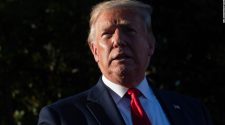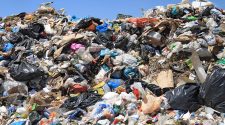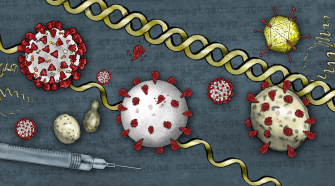Emmanuel Macron, the French president, has floated a plan at the G7 summit to defuse rising tensions in the Gulf by partially lifting the US oil embargo on Iran in exchange for Tehran’s return to full compliance with the 2015 nuclear agreement restricting the country’s nuclear programme.
Donald Trump was noncommittal about the plan. Asked for his reaction at the summit at the French Atlantic resort of Biarritz, the president said he had not discussed the proposal with Macron, contradicting a statement from the Élysée that the G7 had agreed to support a French diplomatic initiative.
Sitting alongside the Japanese prime minister, Shinzo Abe, who made an abortive attempt to mediate between the US and Iran in June, Trump added: “I also support prime minister Abe’s outreach, because he’s also speaking to Iran … We’ll do our own outreach. But you can’t stop people from talking. If they want to talk, they can talk.”
US officials insisted the US policy of “maximum pressure” on Iran was working and had international support.
“The G7 countries all agreed the President’s maximum pressure campaign on Iran is having an impact, and that it should continue,” an official familiar with the talks said.
Trump is accompanied in Biarritz by his hawkish national security adviser, John Bolton, who has opposed any easing of the “maximum pressure” campaign, intended to force its government to halt nuclear activities such as uranium enrichment entirely.
Under the 2015 joint comprehensive programme of action (JCPOA), Iran accepted strict curbs on its activities in return for tax relief.
Under the joint comprehensive plan of action signed in 2015, Iran is only permitted to produce low-enriched uranium. This is uranium that has a concentration of 3%-4% of the isotope U-235. This isotype is a fissile material, which is capable of sustaining a nuclear fission chain reaction.
At this low level of enrichment, it can be used to produce fuel for nuclear power plants. Iran is permitted to stockpile 300kg of it, at an enrichment level capped at 3.67%.
A bomb needs uranium that is up to 90% enriched. Iran’s atomic energy agency has said production of enriched uranium has been quadrupled. The more that uranium is enriched, the faster it is to enrich it further.
Iran argues that it is no longer bound by the cap because of the withdrawal of the US from the agreement, and the reimposition of economic sanctions Donald Trump.
Read more: Iran’s uranium enrichment programme: the science explained
Trump withdrew the US from the agreement in May 2018 and has since steadily increased sanctions against Iran. In response, Iran has begun gradually to break out of the JCPOA limits, increasing its stock of low enriched uranium for example, and raising the level at which it enriches uranium. Iranian forces have also stepped up the harassment of oil shipping going through the strait of Hormuz.
The other parties to the JCPOA – the UK, France, Germany, Russia, China and the EU – have urged both the US and Iran to return to the agreement.
French officials were optimistic they could persuade the US that Macron’s plan was a better alternative to a drift towards a new Middle East conflict. They say it would create a breathing space for talks about issues such as Iran’s ballistic missile programme and its involvement in regional conflicts.
Iran’s foreign minister, Mohammad Javad Zarif, who held talks with Macron in Paris on the eve of the summit, has said the French initiative is moving “in the right direction”.
Such diplomacy could face resistance from Iran’s supreme leader, Ali Khamenei, and hardliners in the powerful Revolutionary Guard, who insist the missile programme and Iran’s regional role are not negotiable.











-MN-01-(16x9)--225x125.jpg)




